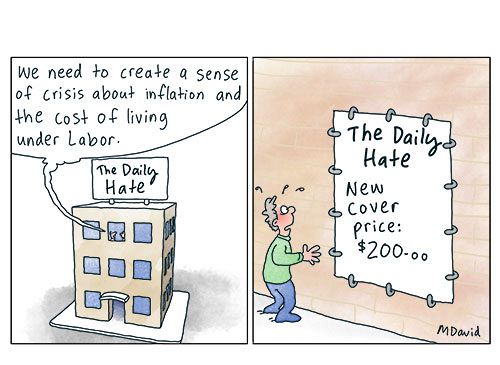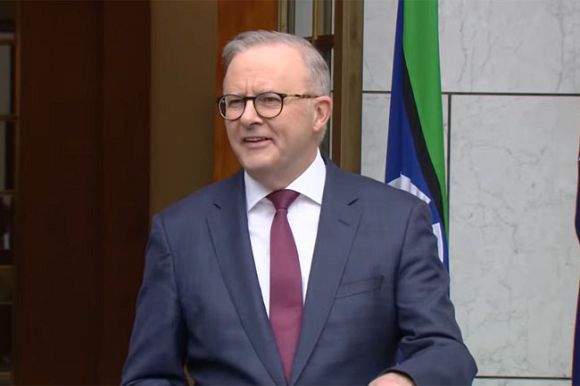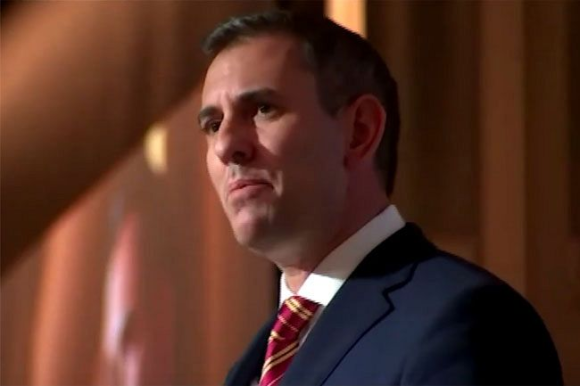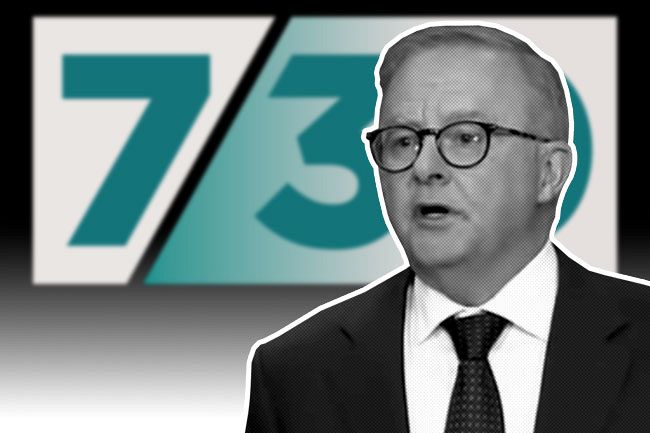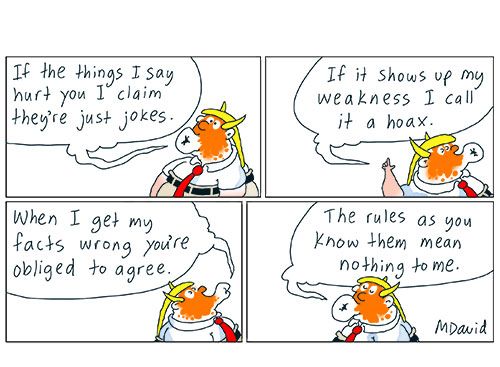A recent interview on ABC was the subject of a formal complaint. The official response from the national broadcaster is even more problematic, as Alan Austin reports.
AN INTERVIEW on ABC's 7.30 in November asserted falsely that poverty in Australia was worsening under the Albanese Government. That segment, as reported here, failed to disclose that the appalling research findings it presented were collected several years before Labor took office.
The official response to the complaint makes even more damning admissions regarding the profound ignorance of ABC News personnel. The full text of the response has been published in the comments section of this article. It prompted this correction.
Open letter to the ABC
Dear ABC Ombudsman’s Office investigating officers,
Thank you for your email of 3 December following the complaint about the 7.30 interview with Australian Council of Social Service (ACOSS) Chief Executive Cassandra Goldie.
Regrettably, your reply raises more concerns.
First, there is no basis for claiming ‘that viewers would understand that the data presented in the report is based on a longer-term study’. Nowhere in the program was it disclosed that the damning situation described prevailed between 2014 and 2021. The entire discussion was in the present tense.
This is a major deception and should be a sackable offence.
Second, its is blatantly false to claim ‘that Ms Goldie’s comments are based on the latest available data’. They most definitely were not. The Bureau of Statistics and multiple other agencies have tracked the recent reductions in poverty and surges in wealth. None of these was referenced in the segment. No current figures were quoted.
Your most astonishing comment is:
‘We are not aware of any evidence to suggest that the figures quoted have changed substantially in the last two years.’
That is frankly appalling. Extensive evidence proves Australia’s economic situation today is vastly different from two years ago.
Australia’s economy has gone from close to the worst-managed in the OECD, according to data from the IMF, the UBS, the World Bank, the OECD, Trading Economics and elsewhere, to near the top today.
The ABC’s unawareness of these major shifts is an indictment of its inability to monitor critical data.
The following are just 19 datasets which expose the falsity of the 7.30 segment, chosen from a much larger list. Click the links for the original data.
1. Age pensions lifted
The single-age pension is up from $967.50 fortnightly when Labor took office to $1,144.40 now, an increase of 18.3%. Inflation over that period has been 10.3%.
2. Higher incomes for the disadvantaged
The fortnightly single youth allowance for living away from home is up from $430.40 in 2022 to $663.30 today, a lift of 54.1%.
The Guardian described these reforms as ‘the biggest lift in decades’. The ABC and ACOSS should know this.
3. Inflation controlled
Monthly inflation was 2.15% last October, down from 6.12% in May 2022. The headline rate has been within the Reserve Bank’s optimum band for three months now. See chart below.
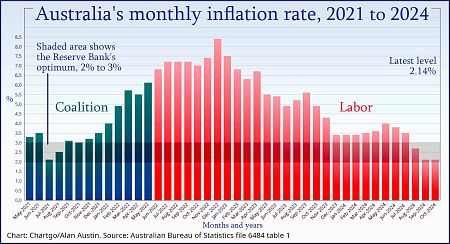
4. Record wage rises
Average weekly earnings increased 5.85% in the year to May 2024, the highest annual rise since records began.
Weekly minimum wages were lifted 12.6% in 2022, from $812.60 to $915.90, the strongest real increase on record.
5. Wages outpacing inflation
Wage rises over the last four quarters have all been above the inflation rate, reversing the situation Labor inherited.
6. Surge in financial wellbeing
Bureau of Statistics data released several weeks before 7.30’s mendacious segment showed household wealth had risen in the 2024 June quarter for the seventh consecutive quarter to a thumping $16.48 trillion. This was 13.2% more than two years prior and 23.7% – almost one quarter – higher than three years ago. See chart below.
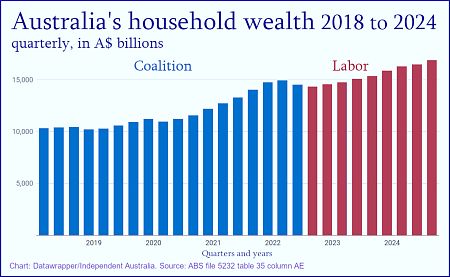
7. Greater share of the world’s wealth
The UBS Global Wealth Report shows Australia’s median wealth per adult is now US$261,805 (AU$421,584.79). This ranks second in the world, up from fourth in 2020 and 2022.
8. Workers’ share of the national pie
The share of gross national income going to employees is up from 49.3% in June 2022 to 53.5% last September. That’s the highest since September 2016. See chart below.
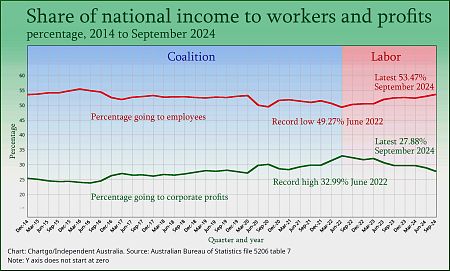
9. Enhanced support for the disadvantaged
Social benefits paid to needy Australians have averaged 6.08% of GDP over the last four quarters. That contrasts with 5.44% in 2018 and 2019.
10. Best jobs outcomes
The employment to population ratio has been above 64.1% for the last six months. This is the first time this has been achieved since records began. The job participation rate hit 67.0 % for the first time last July and has stayed there since.
11. More hours remunerated
The underemployment ratio fluctuated between 8.4% and 14.5% through 2015 to 2020. It is now down to 6.3%.
12. Lift in quality of life
Household spending hit a record $220.1 billion for the 2024 September quarter, 8.9% higher than two years earlier.
13. Spending boom confirmed
Consumer spending hit 16.5% of GDP last June, then reached 16.7% in September, both all-time highs.
14. Record luxury item purchases
Expenditure on cosmetics and dining out hit an all-time high 21% of all retail sales in May 2023 and has remained at or above that level since.
15. Overseas travel
Residents returning from trips abroad in the year to October 2024 numbered a record 9.84 million.
16. More new home loans
Housing finance exceeded $90 billion in the 2024 September quarter, up 22.1% on the previous year.
17. Unemployment dramatically reduced
JobSeeker claimants have been below 5.5% of the labour force for more than a year, the lowest on record. This was 6.6% when Labor took office.
18. Emergency accommodation clients declining
The Australian Institute of Health and Welfare shows homelessness has declined every year since Labor won office. Homeless clients declined from 117.4 per 10,000 population in 2018 to 105.1 in 2024.
19. Demand for emergency assistance
Calls to the National Debt Helpline are now substantially below historic levels and continue to decline.
Calls for help in 2024 totalled 148,607, well under the 2016 tally of 150,917 when the program began, and 15.8% below the 2018 high of 176,472.
These outcomes confirm the Albanese Government is succeeding impressively in shifting wealth and income towards the majority and is reducing poverty dramatically.
Please ensure that newsroom staff are aware of all these databases so false narratives such as that aired on 7.30 last November are not repeated.
Yours faithfully,
Alan Austin
Alan Austin is an Independent Australia columnist and freelance journalist. You can follow him on Twitter @alanaustin001.
 This work is licensed under a Creative Commons Attribution-NonCommercial-NoDerivs 3.0 Australia License
This work is licensed under a Creative Commons Attribution-NonCommercial-NoDerivs 3.0 Australia License
Support independent journalism Subscribe to IA.

Related Articles
- ABC propels Dutton’s disinformation dealers
- EDITORIAL: ABC propels Dutton’s disinformation dealers
- ABC trails Coalition on its Road to Nowhere
- EDITORIAL: ABC trails Coalition on its road to nowhere
- ABC ‘truth bombs’ from Ita Buttrose and Peter van Onselen



